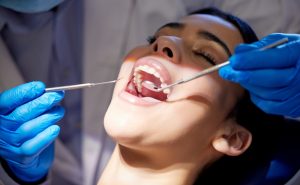Losing a healthy, adult tooth is something we all want to avoid. Unfortunately, accidents happen and certain medical issues can crop up that we can’t control. Whatever the reason is for losing one of your permanent teeth, there are a few things you can do to help alleviate the pain and discomfort. In this blog, the professionals at Parkcrest Dental Group will let you know what you should do if you lose a tooth.
Losing Baby Teeth vs Losing Adult Teeth
When you’re a kid, the most important part of losing one of your baby teeth is to put it under your pillow for the Tooth Fairy. Losing baby teeth is essential to making space for adult teeth to grow in, and it is a normal part of childhood. Losing an adult tooth is typically a much bigger deal. It’s one thing if it’s lost due to bad dental hygiene, but losing a healthy tooth due to an accident or impact is painful and stressful. Not only that, it can have additional side-effects like infection, not to mention pain and difficulty eating.
Basic Steps
If you lose a healthy tooth due to some kind of accident, there are some basic steps you can take.
Keep the Tooth
First of all, don’t just abandon the lost tooth altogether. Depending on how the tooth was dislodged, there may be a way to fix it.
Keep the Tooth Sterile
You need to preserve the tooth. When you pick it up or hold it, don’t do it by the root. It’s important that you do everything you can to only hold the tooth by the crown, as it’s the more durable part of the tooth. Rinse it very gently with saline solution or milk — avoid using water unless you really have no other choice.
Try Putting the Tooth Back
You read that right. Depending on how the tooth was dislodged and the kind of damage sustained, you may be able to temporarily reinsert it into the socket. The key word here is “temporarily”. The tooth won’t just grow back into place, but this is a potential way to keep it sterile and safe.
Gently insert it back into the socket if you can, and then (also gently) bite down on some soft fabric or gauze. You’ll still need to see a dentist as soon as you can. If you have any difficulty at all seeing the socket, or if the tooth is damaged, don’t try and force it back in place. Put the tooth in saline solution or milk (not water, as it won’t keep it sterile) and take it with you to your appointment.
Make an Appointment with Your Dentist ASAP
This is the most important step. As soon as possible after losing the tooth, make an appointment with a dentist or doctor for an emergency visit. The steps in this blog can potentially help avoid permanent damage, but only a professional can provide effective care. Even if a tooth can’t be reset, your dentist can treat the damage and offer alternative solutions or replacements.
Get the Best in Cosmetic and General Dentistry
Whether you need to talk to a dentist about a missing tooth, you’re looking for low-profile braces, or you’re in need of general dentistry, Parkcrest Dental Group is here to help. We’ve been proudly serving the Springfield, MO area for many years, so contact us today for high-quality, friendly dental services you can trust.





